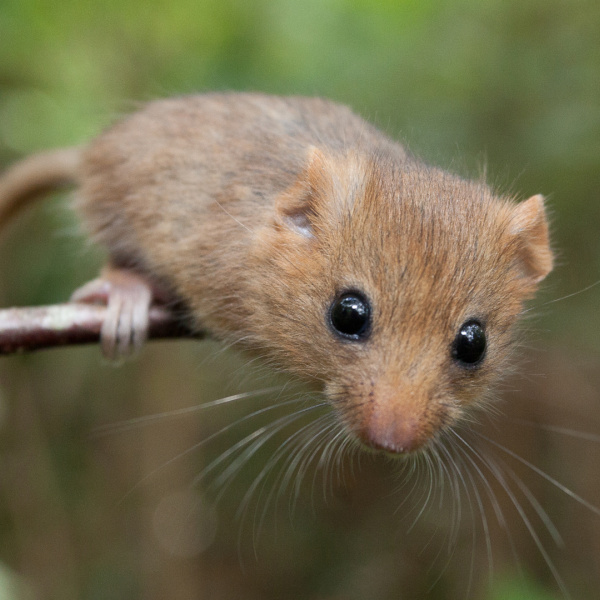One of the UK’s rarest mammals appears to be thriving at our Paccombe Farm in Devon. Learn more about dormice and the steps we are taking to help in their conservation.
Hazel dormice are small rodents with golden-brown fur, large black eyes, long whiskers, and are the only small British mammal with a furry tail. During the warmer months, they are active in hedgerows and connected tree and shrub canopies. During the winter, they hibernate in nests on the ground.
Found in woodland and scrubby habitat linked by hedgerows, their numbers are in decline from the loss of quality habitat and climate change. The State of Britain’s Dormice 2019 report published by People’s Trust for Endangered Species (PTES), notes that their population has dropped by more than 50% since 2000.
Our staff and volunteers at Paccombe Farm, one of our outlying farms, manage Paccombe Wood to improve biodiversity. Hazel coppicing is a part of of this woodland management. It is a traditional method where trees or shrubs are cut back to ground level to promote new growth, creating the structure and food that hazel dormice need. Our Ecology and Conservation team also installed dormouse boxes across the Pig Wood site adjacent to Paccombe Wood a few years ago.
During autumn box checks, staff were delighted to discover several juvenile dormice and nests. As they are now mainly confined to Wales and southern England, their presence in habitat at our sites is very welcome.
Ruth Angell, our Ecology and Conservation Manager, says: "Finding dormouse populations apparently doing well at our sites is fantastic and reinforces the importance of caring for our semi-natural habitats to support wildlife species."
Our teams will continue to monitor the boxes and collect information. The information gathered will be included as part of the National Dormouse Monitoring Programme (NDMP).
Ian White, Dormouse and Training Officer from PTES (who manages the NDMP), says: “The National Dormouse Monitoring Programme has been running since 1990 and there are over 400 sites contributing data to the scheme. Without it we would not know that hazel dormice continue to decline rapidly in the UK, across much, if not all, of the country. It is also thanks to the NDMP and volunteers – like those at The Donkey Sanctuary – that we know in areas where the right habitat exists, dormice are doing well.”
“The NDMP provides the evidence base on which we are able to press strongly for continued and further conservation action to help this endearing species.”
“It is wonderful that a charity dedicated to improving the welfare of domesticated mules and donkeys is also able to help with the conservation of hazel dormice - a small, native secretive rodent whose populations are in steep decline. We hope their dormouse population continues to thrive in East Devon and hopefully one day spread further afield too."



